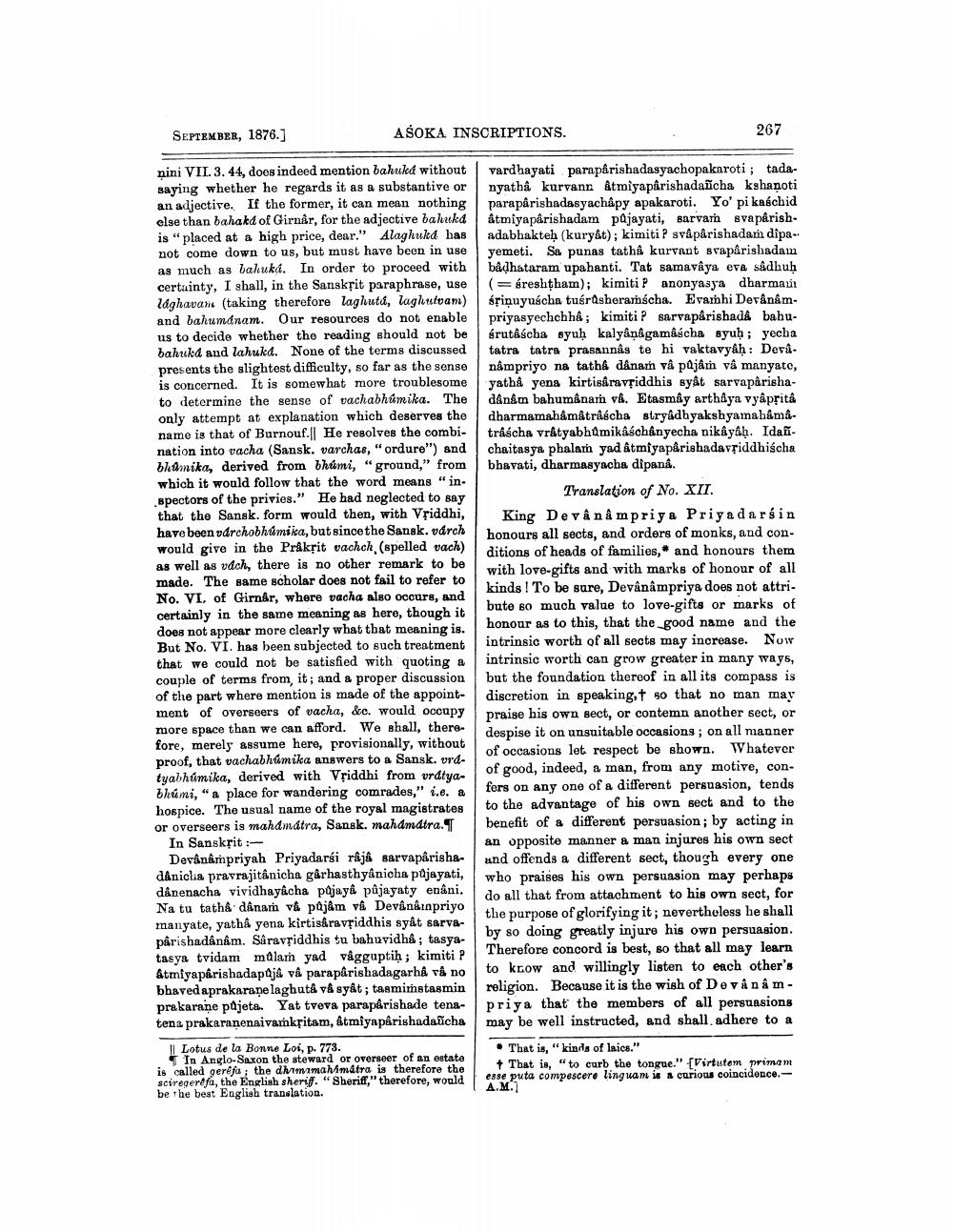________________
SEPTEMBER, 1876.]
ASOKA INSCRIPTIONS.
267
nini VII. 3. 44, does indeed mention bahukd without vardhayati paraparishadasyachopakaroti; tadasaying whether he regards it as a substantive or | nyatha kurvann Atmiyapârishadañcha kshanoti an adjective. If the former, it can mean nothing paraparishadasyachåpy apakaroti. Yo' pi kaschid else than bahakd of Girnår, for the adjective bald åtmiyapirishadam pajayati, Barvar svapérishis placed at a high price, dear." Alaghuka has adabhakteh (kuryat); kimiti? svåpårishadam dipanot come down to us, but must have been in use yemeti. Sa punas tatha kurvant brapärishadam as much as bakuká. In order to proceed with badhataram upahanti. Tat samavâya era sådhuh certainty, I shall, in the Sanskfit paraphrase, use (=sreshtham); kimiti P anonyasya dharmai lághavan (taking therefore lagluta, laghutyan) śpiņuyuscha tusrasheramscha. Eramhi Derânâmand bakumdnam. Our resources do not enable priyasyechchhâ; kimiti? sarvaparishada bahuus to decide whether the reading should not be śrutâścba syuh kalyanagama cha syuh; yecha bahukd and lahuka. None of the terms discussed tatra tatra prasannas te hi vaktavykh : Deva. presents the slightest difficulty, so far as the sense nấmpriyo na tathổ dânon và pajân và manyate, is concerned. It is somewhat more troublesome yatha yena kirtisäravșiddhis syât sarvaparishato determine the sense of vachabhamika. The dânám bahumanam vå. Etasmay arthaya vyâprita only attempt at explanation which deserves the dharmamahämäträscha stryâdhyakshyamahamanamo is that of Burnouf. He resolves the combi- trascha vrátyabhamikaschanyecha nikâyâh. Idañ. nation into vacha (Sansk. varchas,"orduro") and chaitasya phalar yad åtmiyapârisha davriddhischa blednika, derived from bhúmi, "ground," from bhavati, dharmasyacha dipana. which it would follow that the word means "in. Bpectors of the privies." He had neglected to say
Translation of No. XII. that the Sansk. form would then, with Vriddhi,
King Devânâmpriya Priyadarsin have been udrchobhúmika, but since the Sansk. varch honours all sects, and orders of monks, and conwould give in the Praksit vachch (spelled vach)
ditions of heads of families, * and honours them as well as vach, there is no other remark to be
with love-gifts and with marks of honour of all made. The same scholar does not fail to refer to
kinds ! To be sure, Devânâmpriya does not attriNo. VI. of Girnar, where vacha also occurs, and certainly in the same meaning as hero, though it
bute so much value to love-gifts or marks of does not appear more clearly what that meaning is.
honour as to this, that the good name and the But No. VI. has been subjected to such treatment
intrinsic worth of all sects may increase. Now that we could not be satisfied with quoting a intrinsic worth can grow greater in many ways, couple of terms from it; and a proper discussion but the foundation thereof in all its compass is of the part where mention is made of the appoint- discretion in speaking, t so that no man may ment of overseers of vacha, &c. would occupy
praise his own sect, or contemn another sect, or more space than we can afford. We shall, there.
despise it on unsuitable occasions ; on all manner fore, merely assume here, provisionally, without
of occasions let respect be shown. Whatever proof, that vachabhumika answers to a Sansk. urdtyabhumika, derived with Vriddhi from vrdtya
of good, indeed, a man, from any motive, conbhúmi, "a place for wandering comrades," i.e. a fers on any one of a different persuasion, tends hospice. The usual name of the royal magistrates to the advantage of his own sect and to the or overseers is mahdmatra, Sansk. mahamdtra. T benefit of a different persuasion; by acting in In Sanskrit :
an opposite manner a man injures his own sect Devanapriyah Priyadarsi raja sarvaparisha- und offends a different sect, though every one dânicla pravrajitânicha gårhasthyânicha pujayati, who praises his own persuasion may perhaps danenacha vividhayacha pujayê půjayaty enäni.
do all that from attachment to his own sect, for Na tu tathi dânam và pajam ví Deviênốtapriyo
the purpose of glorifying it; nevertheless he shall manyate, yathê yena kirtisaravşiddhis syât sarvaparishadânâm. Sâravsiddhis tu bahuvidha; tasya
by so doing greatly injure his own persuasion. tasya tvidam malam yad vâgguptih; kimiti
Therefore concord is best, so that all may learn Atmiyaparishadap aja vâ parapârishadagarhá vá no
to know and willingly listen to each other's bhaved aprakarane laghutå vå sykt; tasmithstasmin religion. Because it is the wish of Dovana mprakarane pajeta. Yat tveva paraparishade tena- priya that the members of all persuasions tena prakaranenaivamkritam, Atmiyaparishadatcha may be well instructed, and shall adhere to a
|| Lotus de la Bonne Loi, p. 773.
In Anglo-Saxon the steward or overseer of an estate is called gereja: the divimimahinatra is therefore the sciregertfa, the English sherif. "Sheriff," therefore, would be the best English translation.
. That is, " kinds of laics."
+ That is, "to curb the tongue." Virtutem primam esse puta compescere linguam is a curious coincidence. A.M.




